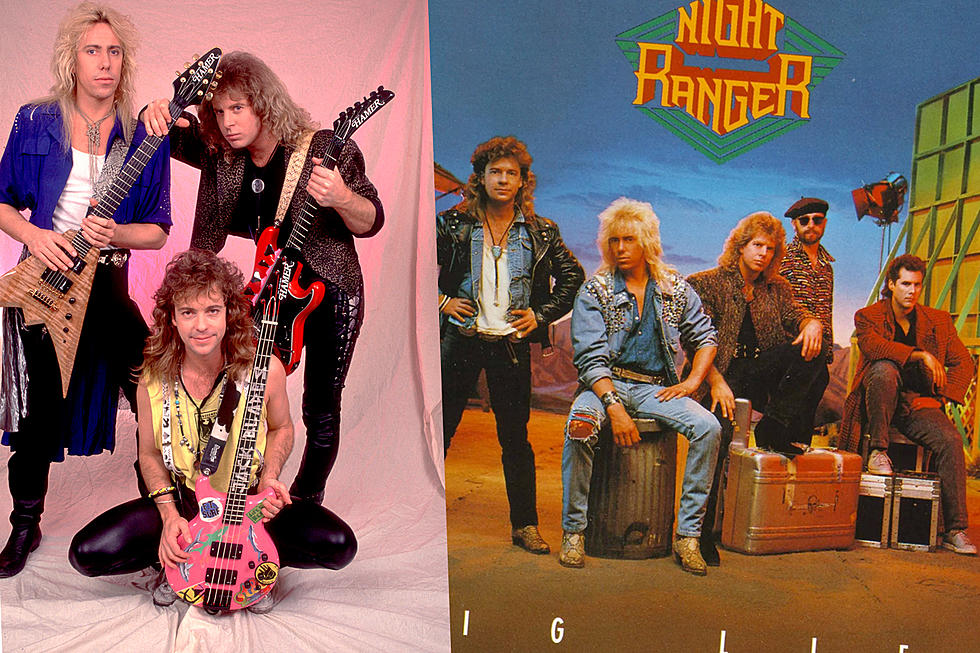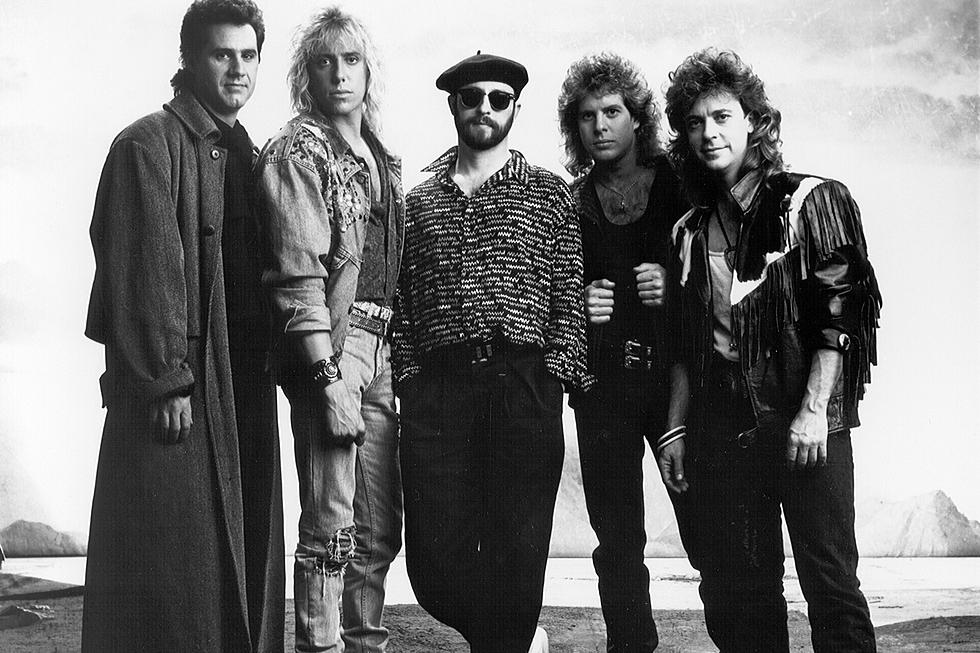
Why Night Ranger’s ‘Big Life’ Was the Beginning of the End
By the time Night Ranger arrived at the release of their fourth album, they were poised to repeat the success of the previous three. But record company politics and a movie opportunity that soured took the band on a different ride.
Released Feb. 25, 1987, Big Life wore the scars and effects of nearly a decade of nonstop hard work. “We had such huge success and the band, we were pretty severely medicated during that period of time,” bassist and vocalist Jack Blades laughed during a 2019 conversation with UCR. “But there’s some good stuff on that record.”
The San Francisco group had logged three straight albums, two of them platinum, collectively filled with a slew of hit singles, including “Sister Christian” from 1983’s Midnight Madness. The ballad, with Night Ranger drummer Kelly Keagy delivering the gritty, emotional vocal, gave the group a real taste of what it felt like to have huge success at both MTV and radio. The song flew all of the way to No. 5 on the Billboard Hot 100 in 1984.
7 Wishes, released in 1985, matched the platinum success of its predecessor and put three additional Top 10 singles on the band’s musical resume. Still, they weren’t happy with the sound of the album and also wanted to make good on a long-held wish to just stay home in the Bay Area to make their next record.
Deciding to break with Pat Glasser, who had produced the group’s previous three LPs, Night Ranger began to meet with prospective producers. “I remember that Ron Nevison showed up. We had lunch in Sausalito and he’s quite a flamboyant character and a really great guy,” Keagy tells UCR now. “He’s super nice.”
Nevison had been in the studio for legendary sessions with the Who and Bad Company in the ‘70s and his success continued to grow into the ‘80s. Coming off a string of hit albums with bands like Survivor and Heart, his plate was crowded.
Still, he was keenly interested in taking on the project. “I really wanted to do that album, but a month or two later something came up. I had my manager, Michael Lippman, call their manager and pass,” Nevison tells UCR via email. “They were really pissed when I turned that down -- so pissed, in fact, that I was afraid when the Damn Yankees project came up two years later, that Jack Blades would sabotage it.”
He invited Blades out to his house in Bel Air and the pair had a nice afternoon. “He admired an American Indian artifact I had,” the producer remembers. “He said he collected that stuff. I told him I would let him have it if the Damn Yankees album went platinum. It did and I did.”
Night Ranger eventually landed on Journey producer Kevin Elson, who signed on to shepherd the album sessions at Fantasy Studios. From the get go, it was a move which felt good. “He had a real strong melodic sense of melody,” Keagy explains. “You could tell if [he liked something] you played for him. His face would light up. He worked on the songs with us to make sure it was the best that it could be.”
“For me, Big Life was a different album in that it had a lot more keyboards in it,” Blades said in 2017. “I’m not sure that I liked that.” In general, the record certainly sounded more technology driven. “It was my introduction to using a Linn drum machine,” Keagy shares. “I bought one and got really familiar with it. I started to use some of the sounds out of it, including on some of the song intros.”
Keyboardist Alan “Fitz” Fitzgerald was a wizard when it came to building up his parts on Big Life. “Some of the sounds that he used on our albums, weren’t heard before he used them,” Keagy points out, noting that the musician would spend months creating, blending and perfecting the various elements. “He was an absolute genius. Some of the sounds were amazing.”
Witness Fitzgerald’s work on the intro to the album’s title track, which sounds like it might have escaped from a Steven Spielberg film. It worked well as a tantalizing introduction to the album, giving way to the twin guitar attack led by Jeff Watson and Brad Gillis. “Big Life” set the stage well for the experience of listening to the rest of the record.
Listen to 'Big Life' by Night Ranger
“Secret of My Success” is probably the most well-known song from Big Life and one that came together outside of the regular album sessions. Bombastic and over the top, David Foster was at the helm, to help the band craft a huge single.
Earmarked as the title track for the Michael J. Fox movie of the same name, the Canadian producer came armed and ready. He had put together the identifiable introduction that would become a signature element of the song.
As Keagy arrived, he found Foster hard at work. “He was holding the reel of tape on a microphone stand and feeding it through a tape machine and those two tracks were recording to another tape machine,” the drummer and vocalist remembers.
The musician quickly discovered the visible passion the producer had for his craft. “He’s holding this microphone and this piece of tape is just going in a loop,” Keagy details, imitating the pattern of the sequence. “I’d never seen anything like that in my life. I’m like, ‘What are these guys doing? These guys are mad scientists!' He looks over at me and he winks at me.”
Keagy summarizes the experience of working with Foster as “awesome,” though the commercial results didn’t fully deliver what the band had been promised. “We’re all sitting around the TV watching the trailer for the movie and it’s like [sings ‘Walking on Sunshine’ by Katrina and the Waves] and I’m like ‘What?,’” Blades remembered in 2014.
Listen to 'Secret of My Success' by Night Ranger
“The movie people didn’t take our song, ‘The Secret of My Success,’ instead they put ‘Walking on Sunshine’ in there,” he continued. “Talk about the high hard one -- we were just like ‘You’ve got to be frikkin’ kidding me.’ We were calling everybody - we were calling attorneys and everybody and they were like, ‘Well, that’s what film people do.’ It’s like ‘Fuck you, we’re going to do what we want.’ So that just crumbled the whole thing -- the whole rollout that we were doing and everything like that was just a disaster.”
It cast an unfortunate pall on any potential success for the Big Life album, a record which already had seen its share of challenges, including the band collectively helping Blades say goodbye to his father, who passed away during the making of the LP.
“Jack and I got on the phone and discussed the chorus in ‘Carry On,’" Keagy remembers. “[His dad] Ned was passing and I thought, ‘What would his father say to him?’ He would want him to carry on. He would want him to keep going,” Keagy explains. “I think that’s where the chorus came up. I came to Jack and I said, ‘What if this was the chorus?' You know, 'I’ll be here to carry on/ I’ll be running down the road beside you.'"
Listen to 'Carry On' by Night Ranger
Personally, Keagy puts at least part of the blame for the failure of Big Life at the feet of “Secret of My Success.” “I’m not totally clear on what everybody else thinks. But I think at the time, we were kind of caught up in that whole thing of record, tour, record, tour,” he says. “I think when they released 'Secret of My Success,' the public and critics heard that song [with] all of those phony sounding horns and stuff. I think it was a disappointment.”
It widened a chasm that had been developing since the success of “Sister Christian,” a song which painted Night Ranger as a ballad band. “They didn’t let us be a rock band for the last two records that MCA was involved in,” Keagy laughs. “I think that was a disappointment for us, that we couldn’t call our own shots at that point. We were just part of the machine and we just felt let down. Because we wanted to release 'Big Life' [as a single]. We wanted to come out of the gate with fire and guns and everything.”
Fitzgerald exited during the early moments in the creative cycle for their next album, 1988’s Man in Motion, which was produced by Keith Olsen. The remaining members decided to be bold. “We thought we were being hot shit. We turned the record in without a ballad,” Keagy says. “They laughed and said, ‘Yeah, right. A Night Ranger record without a ballad. Do you think we want to release it without a ballad?’ They just held our feet to the fire.”
“Restless Kind,” a Keagy-sung ballad, was added to the album and while it was positively received by the label, who expressed excitement about the track, it went unused as a single. After touring for the album wrapped, the members of Night Ranger went their separate ways and moved on to other projects. Keagy and Gillis moved forward and eventually recorded an album under the Night Ranger banner, 1995's Feeding Off The Mojo.
Listen to 'Restless Kind' by Night Ranger
Blades, meanwhile, got a certain last laugh with “High Enough,” his first hit single with Damn Yankees. “Night Ranger, right after 'Sister Christian,' MCA would only allow us to release ballads from that point on,” he explained in 2015. "It was very much a struggle in that context, but it was also a vindication for me, because [Night Ranger’s] record company and producer at that point, wouldn't allow me to sing a ballad.”
“I said, ‘I can sing a ballad,’ and they said, ‘No you can't. You sing the rockers. Kelly sings the ballads. That's how it works. That's the formula,’" he continued. “I was like, ‘Fuck the formula, let's just do this! Let's try it differently this time!’ And they said, ‘No you can't do it.’ So it was a nice vindication for me that I can have a huge smash hit with me singing a ballad.”
Ultimately, the bassist/vocalist wishes they could have had some time away before making Big Life. “I think at that stage of the game, we were just like hamsters in a cage, just going round and round and round and round,” he said in 2017. “I feel like if I would have taken some time and sat back, I could have written songs that were more meaningful to me.”
“Hence, they would have been more meaningful to the audience and stuff like that,” he concluded. “That’s not to say that it wasn’t a good album, but I think it could have been so much better.”
Happily, Night Ranger regrouped with the band's classic lineup beginning in 1996 and now makes music on its own terms. The group has released seven albums to date since the reunion, including 2021's ATBPO, and continue to tour regularly.
Top 100 '80s Rock Albums
More From KOOL 101.7







![Throwback Thursday Music Video: Night Ranger Don’t Tell Me You Love Me [VIDEO]](http://townsquare.media/site/163/files/2015/08/night-ranger.jpg?w=980&q=75)


